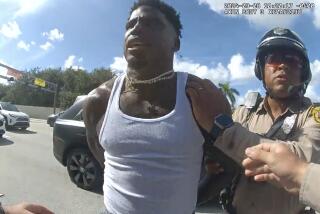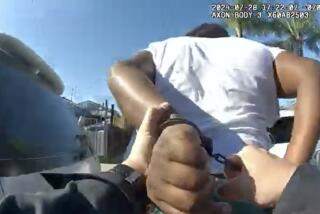Officers Beat King Out of Anger, Transcript Suggests : Trial: Radio tape of dispatchers, who joked about the incident, may be used in federal case against policemen.
In a previously undisclosed radio transcript, a Los Angeles police dispatcher suggests that Rodney G. King was beaten because he angered officers who pursued him on a high-speed chase--not because he was combative, as the four officers accused in the beating have maintained.
The transcript, a copy of which was obtained by The Times, could be used in the upcoming federal trial of the officers, in which prosecutors hope to prove that the policemen worked together to violate King’s civil rights.
The recorded conversation provides fresh insight into the working atmosphere that night among public safety employees who did not yet realize that the beating had been captured on videotape.
The document shows that police and fire dispatchers joked and laughed about the incident before sending an ambulance to the scene, and indicates that the officers were angry at King because he “should know better than to run.”
“He pissed us off, so I guess he needs an ambulance,” the police dispatcher tells the fire dispatcher.
“Little attitude adjustment?” the fire dispatcher answers.
The police dispatcher then says that King “kind of irritated us a little,” and that when someone does that, “they are going to pay a price.”
The Los Angeles Police Department has never publicly released the transcript, and the document was not used as evidence by state prosecutors in their unsuccessful attempt last year to convict the officers during a three-month trial in Ventura County.
A lead federal prosecutor in the second trial, which opens in about a week in U.S. District Court here, confirmed Friday that he has obtained a copy of the transmission. But Justice Department attorney Barry F. Kowalski declined to comment on whether the document would be used against the officers in the federal civil rights trial, or whether the dispatchers would be called to testify.
Like the federal officials, state prosecutors said that because of the pending second trial they will not discuss any King-related material. They also declined to explain why the transcript was not used in the first trial.
Police Lt. John Dunkin also declined to discuss the transcript, saying only that there was a police administrative investigation into the conduct of the dispatcher, whom Dunkin declined to identify.
At the Fire Department, Capt. Steve Ruda declined to identify the dispatcher or say whether his agency has investigated the matter or imposed discipline.
Testimony in the state trial revealed that after the March 3, 1991, beating and while King was being handcuffed, Officer Laurence M. Powell, one of the accused officers, used his walkie-talkie to ask a police dispatcher to request an ambulance at the scene at Foothill Boulevard and Osborne Street in the San Fernando Valley.
The jury in the first trial heard a tape of that brief conversation, in which a man--identified by prosecutors as Powell--was heard laughing while describing King’s “numerous head wounds.”
The dispatchers’ transcript records a conversation that occurred 57 minutes after midnight on March 4. It begins with the police dispatcher laughing and struggling to communicate a request for an ambulance.
The fire dispatcher asks: “What’s the joke?”
“I’m just really swamped,” the police dispatcher responds. He then begins to talk casually about the incident. “Foothill and Osborne,” he says. “In the Valley dude and like he got beat up.”
The fire dispatcher laughs, says “Wait,” and laughs some more before requesting the address again.
“Foothill and Osborne,” the police dispatcher repeats. “He pissed us off, so I guess he needs an ambulance.”
“Little attitude adjustment?” the fire dispatcher asks.
“Yeah, we had to chase him . . . CHP and us. I think he kind of irritated us a little.”
The fire dispatcher asks: “Why would you want to do that for?”
The police dispatcher, laughing, answers: “They should know better than to run. They are going to pay a price when they do that.”
What follows next is a series of questions in which the fire dispatcher attempts to learn information about the incident. The police dispatcher, however, is vague.
“What type of incident would you say this is?” the fire dispatcher asks.
“It’s a . . . it’s a . . . battery. He got beat up.”
“OK, by assailants unknown?”
“Ah, well . . . sort of.”
From the Transcript
In a previously undisclosed Los Angeles Police Department radio transcript from the night of March 3, 1991, police and Fire Department dispatchers joke about Rodney G. King’s injuries. It is also suggested that King was beaten because he angered officers after a high-speed chase, and not because he was combative.
Police: He pissed us off, so I guess he needs an ambulance.
Fire: Oh. Little attitude adjustment?
Police: Yeah, we had to chase him. . . . CHP and us. I think he kind of irritated us a little.
Fire: Why would you want to do that for?
Police: (Laugh) They should know better than to run. They are going to pay a price when they do that.
Fire: What type of incident would you say this is?
Police: It’s a . . . it’s a . . . battery. He got beat up.
Fire: OK, by assailants unknown?
Police: Ah, well . . . sort of.
Fire: OK, any other information as to his injuries, or anything at all?
Police: Nope.
Fire: OK.
Police: Are you kidding? That’s asking too much.
Fire: All righty.
Police: Thanks a lot.
Fire: We’ll send someone out there.
Police: OK.
Fire: Have a nice night.
Police: You too. Bye, bye.
More to Read
Sign up for Essential California
The most important California stories and recommendations in your inbox every morning.
You may occasionally receive promotional content from the Los Angeles Times.










